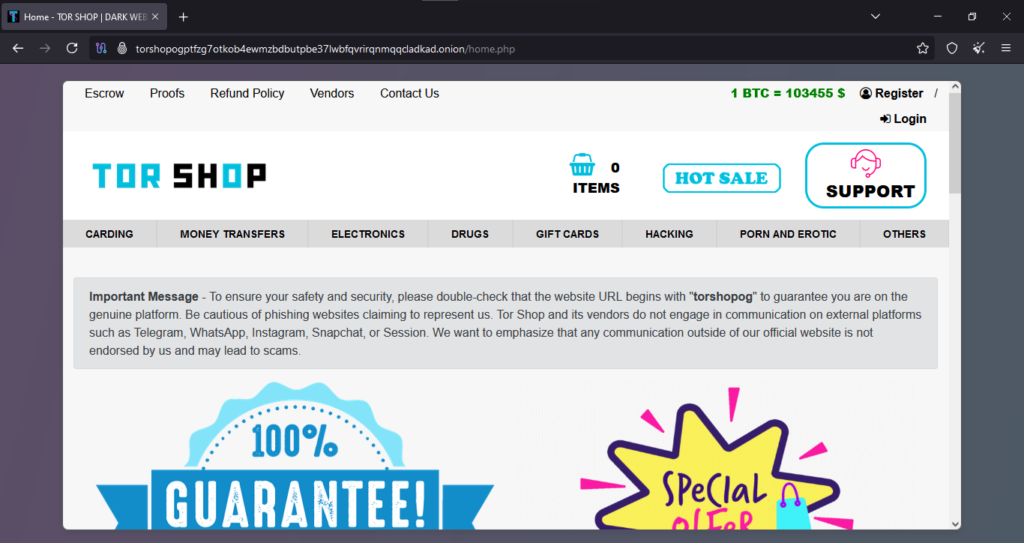Table of Contents
ToggleTor Shop – TOR Scam Report (146)
Onion Link : http://torshopogptfzg7otkob4ewmzbdbutpbe37lwbfqvrirqnmqqcladkad.onion/home.php
Scam Report Date : 2025-01-25
Client Scam Report Breakdown
Original Scam Report :
According to the original scam report, the marketplace in question, referred to as Tor Shop, claims to offer a wide range of illicit goods and services, including carding, money transfers, electronics, drugs, gift cards, hacking tools, and pornographic content. Additionally, the marketplace provides a support section that categorizes these offerings under various labels, suggesting an attempt to establish an organized platform for illegal transactions. However, the report also includes a critical security warning, cautioning users against phishing sites and unauthorized third-party communications on platforms such as Telegram, WhatsApp, Instagram, Snapchat, and Session. This disclaimer indicates that fraudulent schemes have been associated with Tor Shop, where scammers may create counterfeit versions of the site or impersonate vendors to deceive buyers. Despite these warnings, the nature of this marketplace inherently exposes users to high risks, including exit scams, vendor fraud, and phishing attacks that can result in financial losses or legal consequences.
Defining Key Terminology
To fully understand the risks associated with Tor Shop, it is important to define key terms mentioned in the report. Carding refers to the trafficking and use of stolen credit card information to make unauthorized purchases. Money transfers, in the context of black-market transactions, typically involve laundering illicit funds through cryptocurrency or prepaid financial services. Exit scams occur when marketplace administrators shut down operations abruptly while retaining user funds, a common tactic on dark web marketplaces. Phishing is a cyberattack strategy where scammers create fake websites or send fraudulent messages to trick users into revealing sensitive information such as passwords or financial details. By warning against external communication via Telegram, WhatsApp, and other messaging apps, Tor Shop acknowledges that scammers often impersonate official vendors or marketplace representatives to lure victims into fraudulent transactions outside the platform’s escrow system. This suggests that, despite its illicit business model, Tor Shop aims to maintain a level of credibility by discouraging scams that could damage its reputation.
Broader Implications and Scam Analysis
The warning issued by Tor Shop reflects a paradox within the dark web economy: while these marketplaces profit from illegal trade, they also attempt to build trust with users by minimizing scams and fraudulent activities. However, the existence of such disclaimers does not eliminate risk, as dark web platforms are inherently unstable and prone to law enforcement takedowns, insider scams, and fraudulent vendor activities. Additionally, the mention of phishing sites impersonating Tor Shop highlights a broader issue in underground markets—scammers targeting other scammers and illicit buyers. Even if users take precautions, they may still fall victim to fake clones of the site, rogue vendors, or deceptive refund policies. The marketplace’s insistence that it does not communicate outside its official domain reinforces the prevalence of third-party scam operations within this ecosystem. Ultimately, while Tor Shop attempts to warn users against fraudulent activity, participating in such marketplaces carries inherent dangers, including potential exposure to hacking attempts, financial theft, and legal risks for all parties involved.






